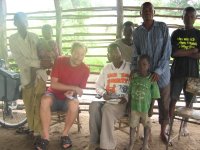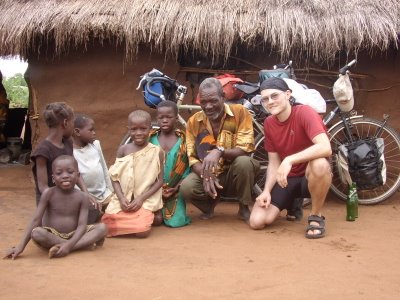My Bike the Teacher
The cycling was tough and the diet repetitive, but the challenging ride from Beira to Blantyre, Malawi taught me a number of lessons. Some may not be so inspiring (such as the fact that my bike, having survived such abusive roads with 100lbs/45kg of equipment, is a proven workhorse), but below I've highlighted a few of the more important ones.
Out of Poverty Springs Ingenuity
We were 45 miles/65 km from Beira on the side of a dirt highway, enjoying a Fanta that we bought from a tiny kiosk made of sticks. We sat on one of several logs neatly arranged on the sandy ground inside a skeletal structure of sticks and trunks, roofed with tattered black plastic and dried grass. A small radio played tinny music, wired to another radio for reception and powered by a long line of batteries taped and cabled together. In front of the logs was a makeshift stick table, which, as it turned out, was the preacher's table. After some conversation with the proprietor we learned that he was a Protestant missionary. The skeletal structure was the
 church, and the logs we sat on were the pews. He lived with his family in three adobe huts around the church. Chickens, cats, and a small goat roamed the compound at will. Most of the food they ate grew around the buildings: corn, manioc, pineapple, sweet potato, papaya, and greens. At left, Mario and preacher, center right, with family inside church.
church, and the logs we sat on were the pews. He lived with his family in three adobe huts around the church. Chickens, cats, and a small goat roamed the compound at will. Most of the food they ate grew around the buildings: corn, manioc, pineapple, sweet potato, papaya, and greens. At left, Mario and preacher, center right, with family inside church.While we talked, the preacher attempted to repair a leaky bicycle tube that had already been repaired so many times it resembled a rubber quilt. His glue had long since run out, so he employed a standard African method of tube repair: tying off the puncture with a salvaged strand of plastic, essentially creating a nipple on the tube. It looks funny but it seems to work. His pump looked like it was hand made from scrap parts in one of the little bicycle repair shacks occasionally found alongside the highway. It didn't form a seal around the tube's valve, so he created the seal by wrapping those same salvaged strands of plastic around the valve and forcing the pump onto it. This connection only lasted for one or two strokes of the pump, then had to be repeated. His progress with the tube was so painfully slow that Mario fetched his pump and repair kit, and with the help of the preacher's knife, which was, again, homemade, they applied a patch and pumped up the tube in no time.
"Mozambique is very poor," the preacher lamented after seeing the efficiency of Mario's pump.
"But not poor in ideas," Mario returned.
There Is Always Something More to Challenge One's Patience and Will
During the first night away from Beira, while we slept in our tent pitched in the stick church, it began
 to rain, setting the mood for the following three days. The dirt highway we were following, which was quite smooth and hard packed the day before, turned to poison for our bikes. Huge puddles and mud pits were interspersed along the increasingly sandy and bumpy road. Our average speed dropped from 18 km/hr the day before to about 10, as we had to repeatedly push our bikes through mud and sand. Frequent bouts of rain kept us wet, but at least cool and shaded from the sun.
to rain, setting the mood for the following three days. The dirt highway we were following, which was quite smooth and hard packed the day before, turned to poison for our bikes. Huge puddles and mud pits were interspersed along the increasingly sandy and bumpy road. Our average speed dropped from 18 km/hr the day before to about 10, as we had to repeatedly push our bikes through mud and sand. Frequent bouts of rain kept us wet, but at least cool and shaded from the sun.Eventually, the tse-tse flies began to attack. An amazingly tough fly with a painful clothes-piercing bite, the tse-tse is attracted to moving objects (like a couple of worn out guys on bicycles), is only escapable at a speed greater than 20 km/hr, and is unfazed by anything but a firm, focused swat. With sand continually grabbing our tires and wresting control of the bike with a force that made me wonder and curse aloud, the tse-tses dive-bombed us from all directions like kamikazes zeroing in on a stranded battleship. It was enough at one point to make me hurl my bike into the sand and launch my helmet into a nearby tree. Mario found it entertaining at least, but helped me regain my composure.
"Scream all you want Derek, I know how you feel. There aren't many times when you really get tested like this."
Good Diet is Key to Good Health
OK, I've known this one for a long time, but I'd never been in circumstances where it was so self-evident. Having a variety of food to choose from is something I had always taken for granted, even while travelling in very poor areas of South America. Here, however,
 access to a healthy and varied diet outside of the cities is reserved only for the economically sound. People in the rural areas live on chima (or nsima, sadza, mealie-meal, depending on the language), an exceedingly bland filler food made of corn meal and water. Heavy and with a sticky, gelatinous texture somewhere between jello and cookie dough, it does a wonderful job of filling the stomach, but not much else. Women can be seen everywhere pounding out cornmeal in huge mortars and pestles to make the staple food (in photo).
access to a healthy and varied diet outside of the cities is reserved only for the economically sound. People in the rural areas live on chima (or nsima, sadza, mealie-meal, depending on the language), an exceedingly bland filler food made of corn meal and water. Heavy and with a sticky, gelatinous texture somewhere between jello and cookie dough, it does a wonderful job of filling the stomach, but not much else. Women can be seen everywhere pounding out cornmeal in huge mortars and pestles to make the staple food (in photo).Most of the time, it was the only complement we could get with dinner (one night it was dinner). It really made me wonder how the people could live their whole lives eating chima every day when I was sick of it after two days. However, they grow up eating it and therefore no dinner seems complete without it, just as I accompany nearly every meal with bread.
We at least were able to afford chicken, which is out of reach for many families. Chickens are probably the most common domestic animal here, and can always be found foraging freely around any settlement. Having a chicken for dinner is just a matter of catching one, killing and plucking it, grilling it over wood coals, and presto! Fresh chicken! The whole process takes about two hours, so an early request or a lot of patience is essential.
Throughout the course of the eight-day ride, at least four chickens were slaughtered on our behalf, usually served with chima, or, just to mix things up whenever we could, rice or noodles. Sending someone to butcher a chicken for us wasn't a particularly appealing notion to me, but after cycling for five hours my body craved hearty sustenance, and a chicken was generally the only source of protein. The implications of this are that a large part of the population here, perhaps the majority, have little nutritional intake beyond the relatively nutritionless starches of corn, which helps explain the slender bodies and bloated bellies of many of the kids. Still, in spite of the hardship, the kids are just like kids anywhere: curious and eager for play. Perhaps there is another lesson to be learned here.
 One Must Experience Rain to Enjoy Sun
One Must Experience Rain to Enjoy SunAt left, a bit of sun over the Zambezi River
The beauty of this maxim is that it can be applied to so many situations. During the eight days and 425 miles/630 km of cycling from Beira to Blantyre, two such situations come prominently to mind.
I rounded a bend in the rocky road and started to roll downhill, as the sun came into view. Mario was already laying on it, soaking it up like a snake freshly emerged from its winter den. It was a paved highway, and after three days of riding through sand, mud, rocks, washboard and potholes, the overcast sky did nothing to shade my sun. I joined Mario, and the two of us sat on the pavement and ate cookies, relishing the end of the rigorous dirt road.
Alem Ethiopian Restaurant, Pizza Palace, Nico's Gelateria, People's Supermarket, ATMs, flushing toilets, hot showers, and a kitchen! It was all here in Blantyre, Malawi; the splendors of civilization were once again at my fingertips! Don't get me wrong, cycling through villages and wilderness, where troops of baboons hang out in the road and people use bicycles without pedals or brakes to transport their goods is a truly fantastic experience. And as a result of the discomforts inherent in such an experience, I am able to enjoy the simple comforts of a city to an extent that would otherwise never occur to me.


2 Comments:
Amazing blog, have to say. Though I just said this in an email to you. Hope to catch you on GTalk sometime soon.
RC
Wonderful story!
Travel Care Air
Post a Comment
<< Home